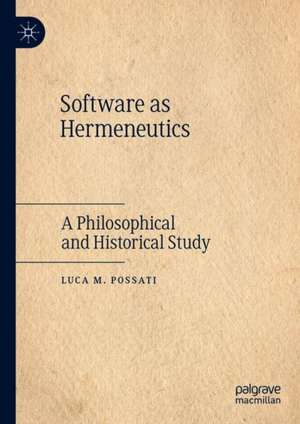Software as Hermeneutics: A Philosophical and Historical Study
Autor Luca M. Possatien Limba Engleză Hardback – 25 iun 2022
| Toate formatele și edițiile | Preț | Express |
|---|---|---|
| Paperback (1) | 775.30 lei 43-57 zile | |
| Springer International Publishing – 26 iun 2023 | 775.30 lei 43-57 zile | |
| Hardback (1) | 780.37 lei 43-57 zile | |
| Springer International Publishing – 25 iun 2022 | 780.37 lei 43-57 zile |
Preț: 780.37 lei
Preț vechi: 951.67 lei
-18% Nou
Puncte Express: 1171
Preț estimativ în valută:
149.32€ • 156.32$ • 123.56£
149.32€ • 156.32$ • 123.56£
Carte tipărită la comandă
Livrare economică 07-21 aprilie
Preluare comenzi: 021 569.72.76
Specificații
ISBN-13: 9783030636098
ISBN-10: 3030636097
Ilustrații: IX, 193 p. 7 illus.
Dimensiuni: 148 x 210 mm
Greutate: 0.4 kg
Ediția:1st ed. 2022
Editura: Springer International Publishing
Colecția Palgrave Macmillan
Locul publicării:Cham, Switzerland
ISBN-10: 3030636097
Ilustrații: IX, 193 p. 7 illus.
Dimensiuni: 148 x 210 mm
Greutate: 0.4 kg
Ediția:1st ed. 2022
Editura: Springer International Publishing
Colecția Palgrave Macmillan
Locul publicării:Cham, Switzerland
Cuprins
1. Introduction: The Paradoxical Onion.- 2. Software and Lived Experience.- 3. Can We Interpret the Code? A Ricoeurian Perspective on Software.- 4. Software and Writing: A Philosophical and Historical Analysis.- 5. The Digital Reflective Judgment.- 6. Conclusions: Toward a Critical Code Thinking.
Notă biografică
Luca M. Possati is a Researcher in Philosophy at the University of Porto, Portugal. His fields of investigation are Philosophy of Technology and Artificial Intelligence. He is the author of many studies in Phenomenology and the History of Philosophy.
Textul de pe ultima copertă
This book claims that continental philosophy gives us a new understanding of digital technology, and software in particular; its main thesis being that software is like a text, so it involves a hermeneutic process. A hermeneutic understanding of software allows us to explain those aspects of software that escape a strictly technical definition, such as the relationship with the user, the human being, and the social and cultural transformations that software produces. The starting point of the book is the fracture between living experience and the code. In the first chapter, the author argues that the code is the origin of the digital experience, while remaining hidden, invisible. The second chapter explores how the software can be seen as a text in Ricoeur’s sense. Before being an algorithm, code or problem solving, software is an act of interpretation. The third chapter connects software to the history of writing, following Kittler’s suggestions. The fourth chapter unifies the two parts of the book, the historical and the theoretical, from a Kantian perspective. The central thesis is that software is a form of reflective judgment, namely, digital reflective judgement.
Luca M. Possati is a Researcher in Philosophy at the University of Porto, Portugal. His fields of investigation are Philosophy of Technology and Artificial Intelligence. He is the author of many studies in Phenomenology and the History of Philosophy.
Luca M. Possati is a Researcher in Philosophy at the University of Porto, Portugal. His fields of investigation are Philosophy of Technology and Artificial Intelligence. He is the author of many studies in Phenomenology and the History of Philosophy.
Caracteristici
Offers the first historical-philosophical research on the origins of software Provides a rigorous definition of software Sheds light on all the transformations (imaginative, political, and social) that software conveys.
